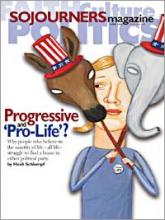I started reading California poet Larry Levis during Lent. It is a season dedicated to taking a long hard look at oneselfpracticing a rigorous moral inventory. Levis is good at this. He is not an explicitly Christian writer, but hes deft at describing our post-Edenic state. "I may not believe in the myth of the Fall," writes Levis, "but it is still possible for me to feel fallen."
Levis poetry forces hard questions. In the poem "Winter Stars," he describes his father breaking a mans hand to stop a knife fight. "I never understood how anyone could risk his life," says Levis, "then listen to Vivaldi." How does one hold violence and beauty in the same breath? We are only human after all.
This is what being fallen feels likepushed with great groaning out of the garden. In our fallenness, we have a hunger for life, yet few chances for eating our fill. In our fallenness, we not only watch our children die, but see our families kill one another. "With a sharpened fruit knife," Levis describes the fight, "he held the curved tip of it, lightly between his first two fingers, so it could slash horizontally, and with surprising grace across a throat." In our fallenness, we become an elegy. Part of us is always weeping for whats lost, what might have been, what will never be. "East of the garden of Eden" time exists. There is narrative. There is memory.
"If we endure our Edens, and that is what we must do," writes Levis, "all easy jubilation ends." Adam and Eve were not condemned to deathto senselessness. They were sentenced to lifeto continue breathing.
Read the Full Article
